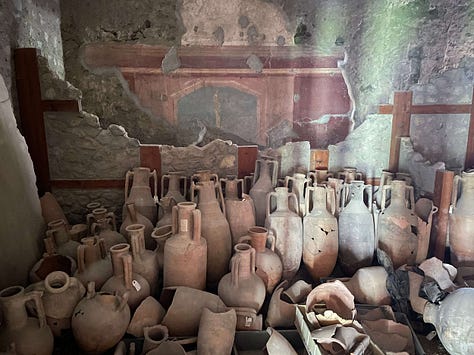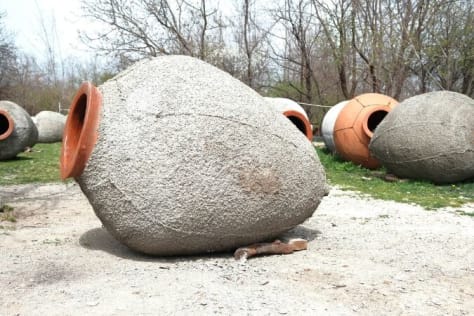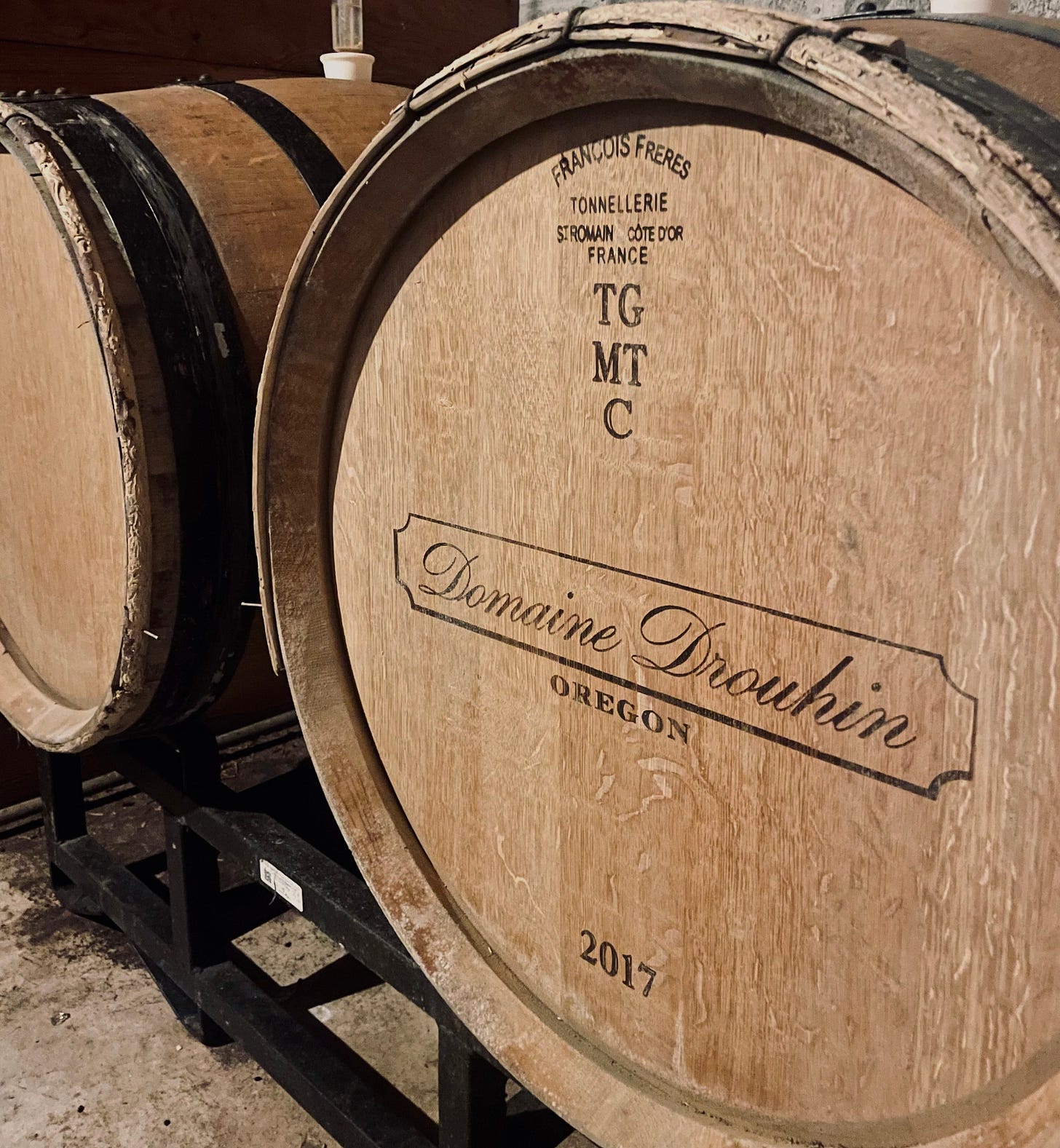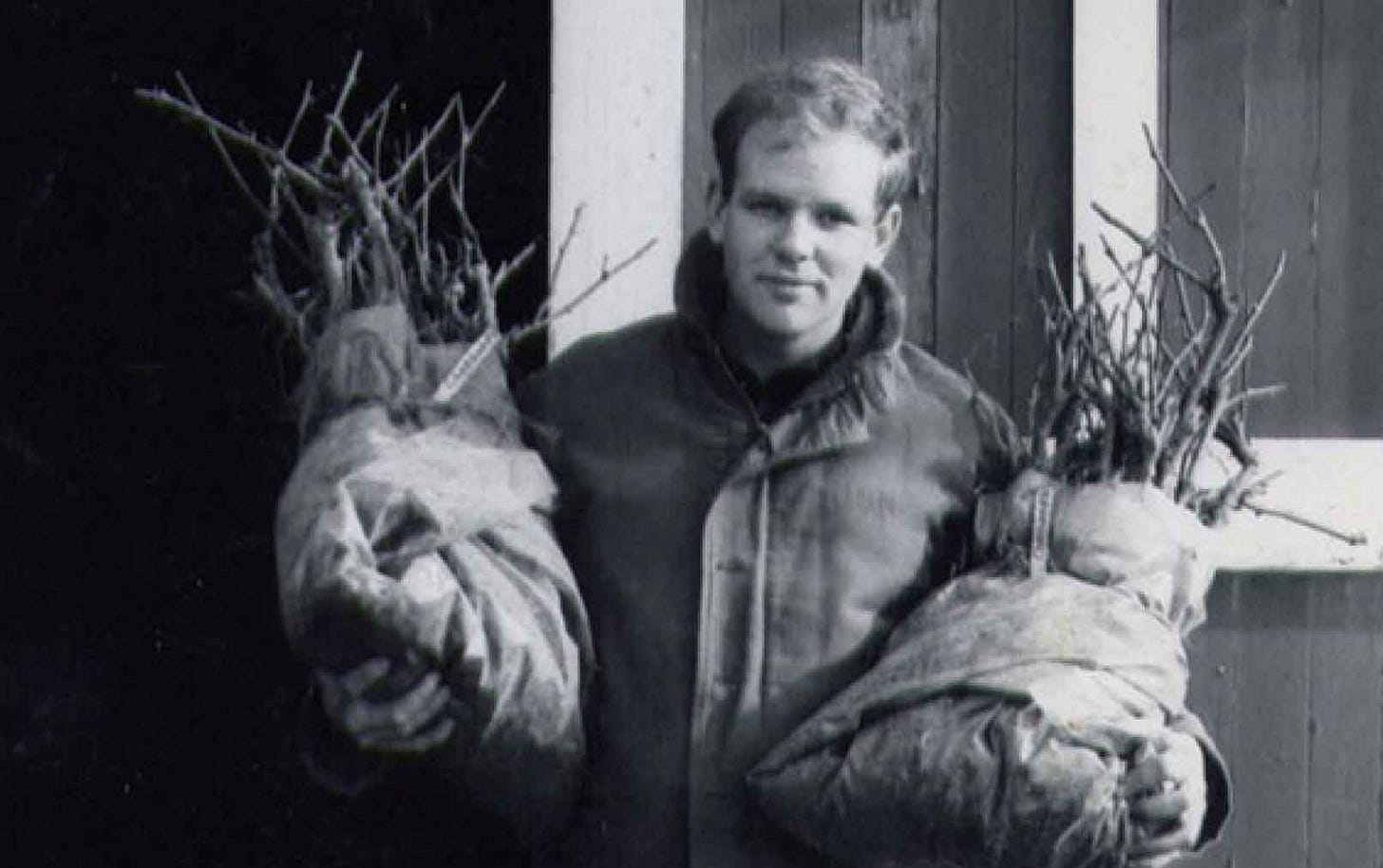Showing Up Late to the Pinot Party
On Starting a Cidery Without Any Money: Part 1
This is part 1 of my series on starting a cidery.
Showing Up Late to the Pinot Party
I.
If we were smart we’d buy a laundromat or an HVAC business from retiring boomers. Or become the slumlords of a run down condo near U of O, renting to undergrads who don’t mind ramen-encrusted carpets and showers that harbor pulsating slime mold1. An old guy on a ski lift once told me college-town slumlording is the surest way to get rich. Problem is, we don’t have extra cash — we being my wife Bernadette and me, and now three-year-old Eloise and eight-month-old Sam. So in lieu of something practical, we’ve opted for a clearly more accessible plan: starting a winery.
I used to see wineries as ventures for people who have too much money and not enough purpose. A private equity bro mid-midlife crisis. The what-to-do-with-great-grandfather's-railroad-money crowd. The standard retirement plan for hall of fame quarterbacks (still waiting for Brady’s announcement)2.
I picture a dim-lit tasting room, the bar a curved mahogany whale belly with gleaming brass rail. Men in fleece vests who talk too close to your face and women with frozen swooping hair. They sigh and murmur terroir and swirl syrupy Cabernet.
Or worse: the biotech nerd, fresh off his IPO windfall, seduced by old world romance. He buys a sunbaked hillside in Santa Barbara and names it Champ de Rêves (Field of Dreams, but in French, so it’s classy), builds a Tuscan villa. Sun leathered migrants work the land — if you squint they could be medieval peasants. Down a spiral staircase he's carved out a cave meant to echo those moldy places where wine has slept since families first put down roots in the Côte-d'Or, where men tread rows of vines their great great grandfathers planted and the bottles are relics furred with dust and cobwebs from a half century's waiting.
I’d really like a moldy cave myself.
II.
But fermentation doesn’t ask for much. Just sugar and time and the wild yeasts that parachute on the wind or cling to fruit skins. Humans have embraced this alchemy since someone stumbled on honey gone strange in a rain-filled pot and found it made the world spin with the same manic excitement felt by a high schooler dipping into their parents’ liquor cabinet for the first time.
Nine thousand years ago the Chinese brewed a medley of rice and honey and hawthorn fruit. The Georgians pressed whole grape clusters into great earthenware eggs, buried and sealed with a ring of wet clay and beeswax. The Romans spiked amphorae with whatever promised vigor - saffron, dates, quince. Pliny the Elder swore by the honey-wine mulsum for curing flatulence. They made a brackish wine called turriculae with seawater and fenugreek, and dark medicinal hippocras with cinnamon and long pepper and clove. They cut their wine with water and thought the Gauls were barbarians for drinking it straight.
When Caesar’s legions pushed into Gaul, they found a wild grape that thrived in Burgundy’s forests — small, thin-skinned, stubborn. That grandaddy of Pinot Noir made wine that sang and the Romans cultivated it, propagating the best vines. When their empire crumbled Cistercian monks carried on the tradition in their damp stone cloisters, mapping each vineyard block’s expression, isolating choice mutations that arose from the grape’s restless genetics, refining its character. In the latter half of the twentieth century universities took up the work. Breeding programs at the University of Dijon and UC Davis churned out clonal variations designed to coax out more floral aromatics or tannic finesse, or to better weather fungal disease.



III.
A century before those academic research projects, Oregon Territory was still fur trapper country. In 1847, as the Hudson Bay Company's grip began to loosen, Henderson Luelling crossed the plains from Iowa, his wagon a traveling nursery of fruit trees and grape cuttings packed in soil-filled boxes. Grapes grew well despite the wet climate and in 1904 German immigrant Ernest Reuter won silver at the St. Louis World's Fair for his Riesling. But seventeen years of Prohibition erased that heritage. When young David Lett wagered that the sodden Willamette Valley might harbor some of the same magic as the ancient limestone slopes of Burgundy, people told him he was crazy. They said the rain would rot his shirt off.
In 1965 he arrived with a viticulture degree from UC Davis and three thousand Pinot Noir cuttings in his uncle's horse trailer. He rented nursery space and rooted them, and founded Eyrie Vineyards. When the grapes thrived a stream of Davis-trained vintners followed and the Willamette Valley gained fame as Burgundy’s little brother. Folks in Newberg in the heart of wine country began gleefully calling themselves Newburgundians.
A decade later Eyrie upended the old order, claiming silver at the French Wine Olympiad in a blind tasting. Only Domaine Drouhin stood above them, a family who had worked Burgundian soil for over a century. Robert Drouhin had to come see the valley for himself. Soon he too had planted in the Dundee hills, giving his family’s new world incarnation the motto French soul, Oregon soil.
So we’re at least twenty five years late to the Pinot party here in Oregon. The valley’s south-facing hills are already stitched with vines. You can’t toss a rock in a wine shop without hitting a bottle of it. Is there any need for another winery?
The labels on our two secondhand barrels in the barn read Domaine Drouhin. But I don’t want our wine to be the castoff of a French legacy, despite my reverence for its long and storied history. I want it to have an American soul — something that tastes like this country’s tumultuous ferment, something scruffy that grows up out of neglected fields given over to goldenrod and scotch broom, that truly comes from the territory.
IV.
Soon after moving here I noticed that if you drive down some back road in farm country — one not shaded by an ocean of doug fir — you’ll find the ghosts of old homesteads and their feral children.
Apple trees slumped under the weight of fruit that drops and rots, acid-green and bitter. Gnarled pears that elbow through blackberry thickets, unruly vertical shoots studded with small brown tannin bombs that sandpaper your mouth. Not to mention the countless yard trees in town that pelt driveways with their excess, unwanted by homeowners.
Gather up the windfall and haul it back home, heirlooms chucked in with the misshapen mongrels and wee crabs. Wash off the deer spit and crush them. Add nothing to the juice — let the microbial cowboys who rode in on the flesh do their work unhindered. Shield it from air once the yeasts have drunk themselves to death and sloughed off to the bottom of the bin, then put it to bed in a barrel for the winter. Let it rekindle and come of age in the spring and by summer you’ll have yourself a fine drink that will forever remind you of the late cold spell that year, the wild rose and poison oak you waded through to reach an old tree laden with fruit, the father of the woman who let you glean her orchard, planted by him a century ago, now half-dead and glorious.
A cidery, then. How about that?
Yes, I’m ashamed to admit my shower indeed grew slime mold in college.
Joe Montana, Dan Marino, John Elway, Drew Bledsoe…





I grew up in the Willamette Valley. My mother's family still owns property in the Oregon Coast Range, acres of forest around the house and farm my deceased grandfather built. I visited the site a few summers ago; it was pretty overgrown, but there were apples and blackberries in abundance.